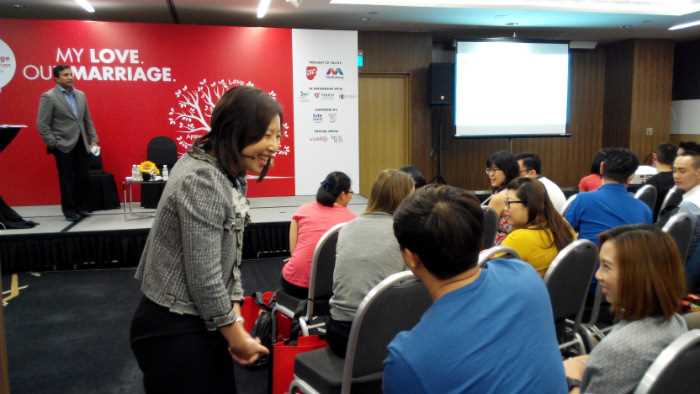Families For Life | When Marriage Begins
At Marriage Convention 2016, many soon-to-be-wed couples were treated to a lighthearted but enlightening talk on 19 March 2016 by lawyer-couple, Boaz and Claire Nazar, marriage trainers of the Prevention and Relationship Enhancement Programme® (PREP). They examine the safety cornerstones and expectations of marriage, sharing tips to create enduring love.
Running the Distance to the Finish Line
The speakers at the When Marriage Begins talk have a deep passion to see couples make it to the finish line and fulfill their marriage vows ‘till death do us part’. This is not least because Mrs Claire Nazar, a FFL council member, is a long-distance runner, and her husband Boaz, is a self-professed ‘television-couch-to-kitchen sprinter’.
 As master trainers of the 12-hour Prevention and Relationship Enhancement Programme® (PREP) course — a widely recognised programme based on research conducted by the University of Denver — the lawyer-couple kept a hall packed with soon-to-be-wed couples highly engaged (pun unintended) during their humour-sprinkled, sold-out session.
As master trainers of the 12-hour Prevention and Relationship Enhancement Programme® (PREP) course — a widely recognised programme based on research conducted by the University of Denver — the lawyer-couple kept a hall packed with soon-to-be-wed couples highly engaged (pun unintended) during their humour-sprinkled, sold-out session.
The interactive session to prepare young couples for life after the big wedding, aptly made use of a ‘Pigeonhole Live’ smartphone app to track real time participant responses to propositions such as:
- Commitment means being faithful until one or both of you decide it is enough.
- Pulling back commitments when you are upset, angry or had a quarrel with your spouse is acceptable.
Claire and Boaz encouraged couples to give honest, self-reflective answers, even if they may not be “politically correct” and the poll results showed quite a number who held these beliefs. The speakers then advised that a marriage premised on these beliefs would be shaky.
Safety First
Before the family home can be a safe haven for family members to grow and love one another, a couple’s marriage must be stable and kept safe. The Nazars highlighted three ‘safety’ pins in scoring the coveted goal of a healthy and happy marriage:
- Commitment Safety
- Emotional Safety
- Personal Safety
Commitment is about protecting who you are as a couple and what you are building together for the future,” they shared.
Happily married couples have a purposeful ‘Us with a Future’ sense of togetherness and direction which they see themselves working and moving towards. They talk openly, share thoughts and support each other, without fear of either emotional harm, physical harm or intimidation.
‘Great Expectations’ of a Marriage
The speakers addressed commonly held views and expectations about gender roles, time together, money, birth control, children and core values in the context of marriage.
Couples need to understand that differences in expectations stem from several factors: personality, parents, family background, upbringing, past relationships, friends, religious/cultural beliefs, traditions, even television, music and social media.
Where expectations exceed reality, one is bound to experience disappointment.
Consider this formula:
If R (Reality) < E (Expectations)
Then R = D (Disappointment)
To mitigate disappointment, one needs firstly to be aware of the basis for one’s expectation, assess its reasonableness, then skilfully express and communicate one’s thoughts to the spouse. If necessary, both should make suitable changes so as to better manage and resolve the differences in expectations.
Focus on the Good
The talk came to a fruitful close with a vibrant Q&A segment. One question that drew much interest was: How do couples constantly remind themselves not to take each other for granted along the marriage years?
Openly acknowledging the ‘downside of commitment’, the speakers noted that problems arise when parties take commitment for granted and think, “My spouse is supposed to be committed, so he or she will always stay/stick around.” This perspective can lead parties down a slippery slope because when one partner takes things for granted, he or she will not give their spouse top priority.
They recommend that marriage partners draw up an appreciation list of each another. “Focus on the good things; think of ways to show appreciation,” they urged. Intentional acts, such as practising the habit of giving thanks for each new day with the spouse, have proven to be very effective.
Sorry is Not the Hardest Word
Another ‘hot’ question was: “How do you resolve disagreements and quarrels with your other half? Sometimes, the other partner just insists he is right.”
Boaz replied unabashedly, “I would always be the first to apologise. I say to my wife: I am sorry Claire... but you are wrong...” much to everyone’s amusement.
He also provided the following ‘safety procedure’ tips:
- Learn to calm yourself down
- Withdraw from conflict situation where necessary
- Always sit down in a good state of mind to talk over the problem
- Don’t let the issue at hand ‘define’ the marriage (lest in winning the argument now, you lose the war in the long term...)
Enduring Love
To make a relationship last, it is inadequate to merely ‘endure’, either the existence of the other, or the feeling of being ‘tied’ down.
On the contrary, to build an enduringly loving, lasting and strong marriage, partners must share deep, connected ties cushioned in safety, in terms of long-term commitment, reciprocal devotion, mental and physical well-being.
Marriage Convention 2016 is an annual event organised by Families For Life (FFL), for experts to share know-how and tips with couples, to foster happy and healthy marriages.